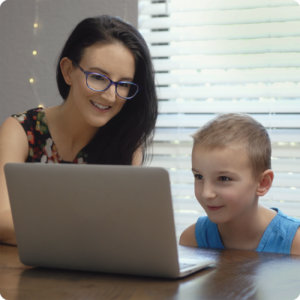Homeschooling with Dyslexia: Is it Better for A Child?
Written by Sandie Barrie Blackley, Speech-Language Pathologist
Published on October 14, 2022
 Parents who see their dyslexic child struggle with traditional schooling often wonder: Might homeschooling be better for my child?
Parents who see their dyslexic child struggle with traditional schooling often wonder: Might homeschooling be better for my child?
Dyslexia does not fit neatly into a box—this cause, this manifestation, this treatment—but instead is on a continuum. Some students with dyslexia have mainly spelling and writing difficulties while others struggle to read even single-syllable words. Some dyslexic students, including those with apparently mild symptoms, may suffer from extreme stress and anxiety related to reading and writing.
Because of this variability, there is no one-size-fits-all solution for dyslexia. In this post, we will provide some practical, research-based guidance for parents who may be wondering if homeschooling is the best option for their child.
A New Time for Homeschooling
Students with dyslexia differ widely. At the same time, homeschooling differs widely from home to home. For example, some homeschoolers use a structured, academic curriculum. Some attend a full-time online school. Others are part of the unschooling movement in which life is the curriculum and there are no formal lessons.
Homeschooling is definitely growing. It is more often an option today, as more than half of American adults work from home, at least part time. Encouraged by the necessity of isolation during the early days of Covid-19, parents have become more resourceful and more willing to take on the responsibility of home-based education. In addition, many of the instructional barriers that once discouraged parents from homeschooling are lower in new, sophisticated, online material.
Is Homeschooling Right for Your Family?
But before jumping onto the homeschooling bandwagon, it makes sense to evaluate the costs and critical elements of schooling options that are available and possible for you and your child. The chart below is designed to help you compare schooling options and spot the most promising ones.
As you complete the chart, bear in mind these important considerations:
- Hours per day – Successful homeschooling (even unschooling!) requires adult guidance and supervision. A homeschool parent needs schedule flexibility and availability but also the interest and patience to provide consistent guidance and supervision on a daily basis.
- Curriculum – All students benefit from challenging, knowledge-based curricula in subject areas such as social studies and math. All students, and especially those with dyslexia, need a structured literacy curriculum. They may benefit from using technology, such as audiobooks, to access their subject matter curricula.
- Costs – Costs may include:
- Tuition or fees
- Curricular materials or subscriptions
- Technology
- Extracurricular activities
- Transportation
- Uniforms or other clothing
- Special testing (e.g., some states require annual testing for homeschoolers)
- Lost income
- Requirements – Some private schools have admissions requirements, and public and public-charter schools often have residency requirements. Some states have homeschool requirements. See Homeschool Laws by State.
- Pros & Cons for the child – Think about the setting(s) in which your child is most attentive and engaged. Some students learn best in group situations, with peer engagement. Others learn best in one-on-one discussions with an adult or when using interactive media. Knowing what helps your child pay attention and stay engaged is important because attention and active engagement are two of the four “pillars” of learning.

Summarizing their 2021 multi-day, virtual conference on The Post-Pandemic Future of Homeschooling, the Harvard Kennedy School of Education leaders concluded, “The success of homeschooling seems to depend largely on the individual child and parents.”
Even if you decide that homeschooling is not the best option for your family at the present, there are plenty of things you can do to help your struggling reader at home!
Lexercise is Here to Help when Homeschooling a Dyslexic Child
To learn more about dyslexia, homeschooling, and the latest resources to support you and your child, sign up for the Lexercise blog below. If you suspect that your child may be a struggling reader or have a learning disability, visit the Lexercise testing page and take the first step toward helping your child become a skilled and confident reader and writer.
Improve Your Child’s Reading
Learn more about Lexercise today.
Schedule a FREE
15-minute consultation


